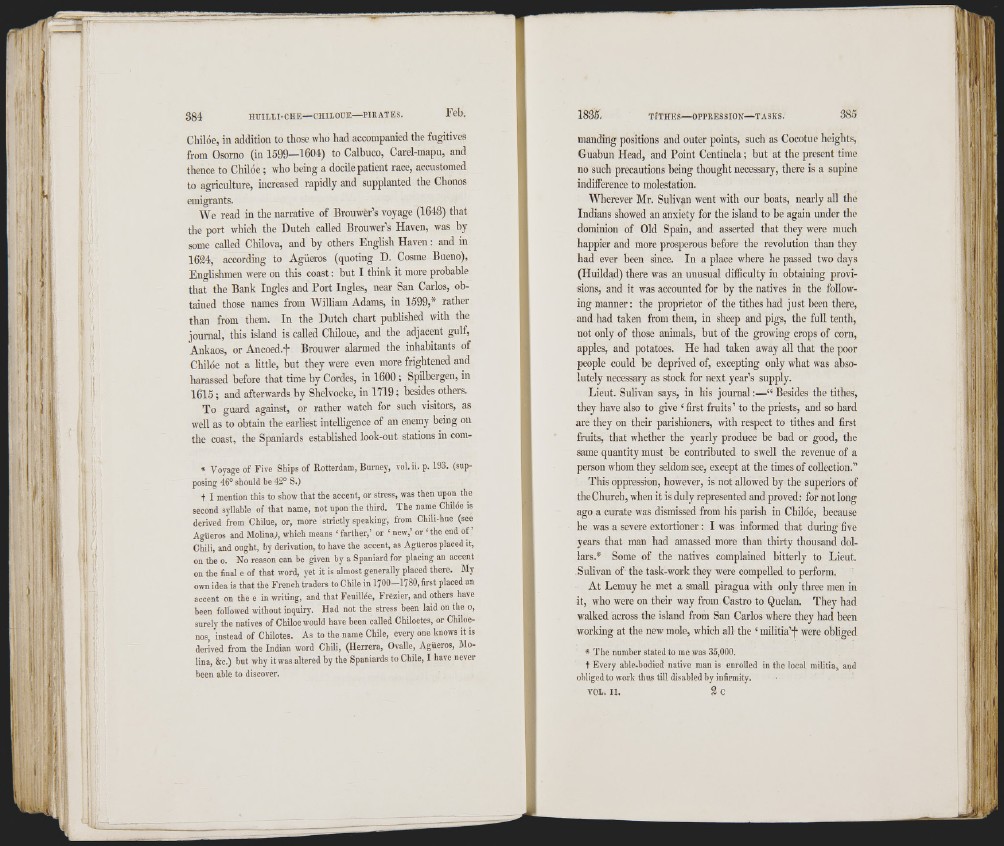
i'"'”'
7 1 . '■
I ■
i r
Í i
i¡
i
i i
384 HUILLI-CHE— CHILOÜE PIRATES. Feb.
Chilóe, in addition to those who had accompanied the fugitives
from Osorno (in 1599—1604) to Calbuco, Carel-mapu, and
thence to Chilóe ; who heing a docile patient race, accustomed
to agriculture, increased rapidly and supplanted the Chonos
emigrants.
AVe read in the narrative of Brouwer’s voyage (1643) that
the port which the Dutch called Brouwer’s Haven, was hy
some called Chilova, and hy others English Haven ; and in
1624, according to Agüeros (quoting D. Cosme Bueno),
Englishmen were on this coast; hut I think it more probable
that the Bank Ingles and Port Ingles, near San Carlos, obtained
those names from AVilliam Adams, in 1599,* rather
than from them. In the Dutch chart published with the
journal, this island is called Chiloue, and the adjacent gulf,
Ankaos, or Ancoed.f Brouwer alarmed the inhabitants of
Chiloe not a little, but they were even more frightened and
harassed before that time by Cordes, in 1600 ; Spilbergen, in
1615 ; and afterwards by Slielvocke, in 1719; besides others.
To guard against, or rather watch for such visitors, as
well as to obtain the earliest intelligence of an enemy being on
the coast, the Spaniards established look-out stations in com-
• Voyage of Five Ships of Rotterdam, Burnej-, vol. ii. p. 193. (sup-
posing] 46° should be 42° S.)
+ I mention this to show that the accent, or stress, was then upon the
second syllable of that name, not upon the third. The name Chilóe is
derived from Chilue, or, more strictly speaking, from Chili-hue (see
Agüeros and MolinaJ, which means ‘ farther,’ or ‘ new,’ or ‘ the end of’
Chili, and ought, by derivation, to have the accent, as Agüeros placed it,
on tbe 0. No reason can be given by a Spaniard for placing an accent
on the final e of that word, yet it is almost generally placed there. My
oivn idea is that the French traders to Chile in 1700—1780, first placed an
accent on the e in writing, and that Feuillee, Frézier, and others have
been followed without inquiry. Had not the stress been laid on the o,
surely the natives of Chiloe would have been called Chiloetes, or Chiloe-
nos, instead of Chilotes. As to the name Chile, every one knows it is
derived from the Indian word Chili, (Herrera, Ovalle, Agüeros, Molina,
&c.) but why itwas altered by the Spaniards to Chile, I have never
heen able to discover.
1835. TITHES—OPPRESSION—TASKS. 385
mandiug positions and outer points, such as Cocotue heights,
Guabun Head, and Point Centinela; but at the present time
no such precautions being thought necessary, there is a supine
indifference to molestation.
AVherever Mr. Sulivan went with our boats, nearly all the
Indians showed an anxiety for the island to be again under the
dominion of Old Spain, and asserted that they were much
happier and more prosperous before the revolution than they
had ever been since. In a place where he passed two days
(Huildad) there was an unusual difficulty in obtaining provisions,
and it was accounted for by the natives in the following
manner; the proprietor of the tithes had just been there,
and had taken from them, in sheep and pigs, the full tenth,
not only of those animals, but of tbe growing crops of corn,
apples, and potatoes. He had taken away all that the poor
people could be deprived of, excepting only what was ahsolutely
necessary as stock for next year’s supply.
Lieut. Sulivan says, in his journal:—“ Besides the tithes,
they have also to give ‘ first fruits ’ to the priests, and so hard
are they on their parishioners, with respect to tithes and first
fruits, that whether the yearly produce be bad or good, the
same quantity must be contributed to swell the revenue of a
person whom they seldom see, except at the times of collection.”
This oppression, however, is not allowed by the superiors of
the Church, when it is duly represented and proved: for not long
ago a curate was dismissed from his parish in Childe, because
he was a severe extortioner; I was informed that duringO five
years that man had amassed more than thirty thousand dollars.*
Some of the natives complained bitterly to Lieut.
Sulivan of the task-work they were compelled to perform.
At Leniuy he met a small piragua ivith only three men in
it, who were on their way from Castro to Quelan. They had
walked across the island from San Carlos where they had been
working at the new mole, which all the ‘ militia’-f- were obliged
* The number stated to me was 35,000.
t Every able-bodied native man is enrolled in the local militia, and
obliged to work thus till disabled by infirmity.
VOL. n. 2 c